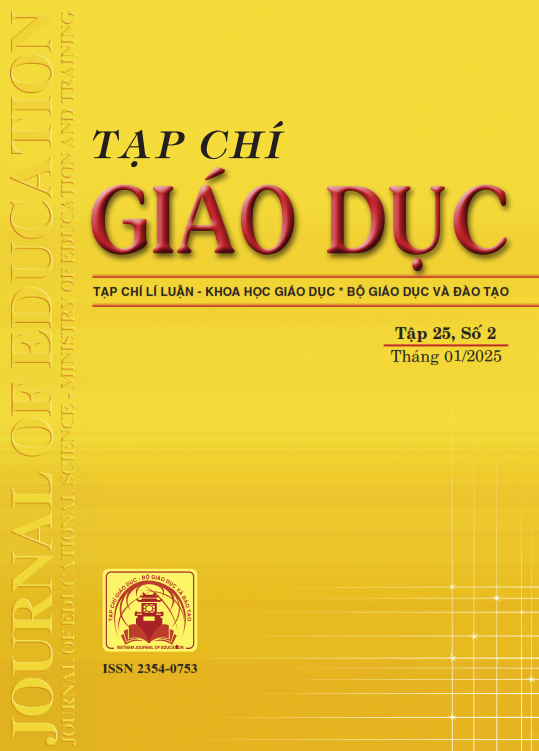Ứng dụng công nghệ số trong giáo dục đại học của Canada: Kinh nghiệm và khuyến nghị
Tóm tắt
Digital technologies have gained traction in higher education as they not only reshape and digitize lecturer-student communication on campus but also - in the era of globalization - bring education to the world. The application of digital technologies in higher education aims to improve the quality of teaching and learning, increase access to technology, enhance students’ interaction and learning experience. Such capabilities of digital technologies offer new opportunities for universities, and allow them to parade into a completely new market. The purpose of this article is to recap Canada’s experience in applying digital technologies in higher education, thereby drawing lessons and implications for Vietnamese higher education. The findings underscore manifold benefits of digital technologies application in Canadian higher education including improving teaching quality, flexible learning and research, and enhancing lecturer-student interaction. The proposed lessons can be applied in Vietnam to improve the quality of local higher education, meeting the requirements of the digital age.
Tài liệu tham khảo
Bates, A. W. (2022). Teaching in a digital age: Guidelines for designing teaching and learning (3rd ed.). Tony Bates Associates Ltd. https://pressbooks.bccampus.ca/teachinginadigitalagev3m/
Bereznoy (2018). Multinational Business in the Era of the Global Digital Revolution. World Economy and International Relations, 62(9), 5-17. https://doi.org/10.20542/0131-2227-2018-62-9-5-17
Danby, S., Fleer, M., Davidson, C., & Hatzigianni, M. (2018). Digital Childhoods across contexts and countries. In S. Danby, M. Fleer, C. Davidson, & M. Hatzigianni (Eds). Digital childhoods: Technologies and children’s everyday lives (pp. 1-14). Springer Nature. https://doi.org/10.1007/978-981-10-6484-5_1
Dittler, W. (2017). Brief Historical Overview of the Previous Three Waves of E-Learning, E-Learning 4.0. Mobile learning, learning on smart devices and social networks. De Gruyter.
Donovan, T., Bates, T., Seaman, J., Mayer, D., Martel, E., Paul, R., Desbiens, B., Forssman, V., & Poulin, R. (2018). Tracking Online and Distance Education in Canadian Universities and Colleges: 2018. Canadian Digital Learning Research Association.
Hofhues, S. (2018). Education in the Age of Digital Change. Goethe Institut. https://www.goethe.de/ins/ru/ru/spr/ mag/21272715.html
HSE University (n.d.). 12 Solutions for New Education. https://www.hse.ru/en/twelve/
Johnson, N., Seaman, J., & Poulin, R. (2022). Defining Key Terms Related to Digital Learning: Survey of Higher Education Faculty & Administrators Summary Report. https://wcet.wiche.edu/wp-content/uploads/sites/11/ 2022/08/Defining-Key-Terms-Summary-Report-Final.pdf
Naffi, N., Davidson, A.-L., Snyder, D., Kaufman, R., Clark, R. E., Patino, A., Gbetoglo, E., Duponsel, N., Savoie, C., Beatty, B., Wallace, G., Fournel, I., Ruby, I., & Paquelin, D. (2020). Disruption in and by Centres for Teaching and Learning During the COVID-19 Pandemic: Leading the Future of Higher Ed. Observatoire international sur les impacts sociétaux de l’IA et du numérique (OBVIA). https://www.docdroid.net/L0khasC/ whitepaper-disruption-in-and-by-centres-for-teaching-and-learning-during-the-covid-19-pandemic-leading-the-future-of-higher-ed-21-08-2020-pdf
Royal Bank of Canada (2018). Humans Wanted: How Canadian youth can thrive in the age of disruption. Royal Bank of Canada. https://www.rbc.com/dms/enterprise/futurelaunch/_assets-custom/pdf/RBC-Future-Skills-Report-FINAL-Singles.pdf
Seaman, J., & Seaman, J. (2023). Digital Learning Pulse Survey: The Digital Transformation of the Community College. Bay View Analytics. https://www.bayviewanalytics.com/reports/pulse/digital-transformation-community-college.pdf
The Digital Future of Education (2019). How do Russian teachers integrate technology into the educational process? Analytical Center NAFI. https://nafi.ru/en/projects/sotsialnoe-razvitie/tsifrovaya-gramotnost-rossiyskikh-pedagogov
UNESCO (2011). UNESCO ICT Competence Framework for Teachers. https://iite.unesco.org/pics/publications/en/ files/3214694.pdf
UNICEF (2021). Growing up in an AI world: How can artificial intelligence (AI) systems promote and protect children’s rights?. https://www.unicef.org/innocenti/stories/growing-up-in-an-ai-world
Tải xuống
Đã Xuất bản
Cách trích dẫn
Số
Chuyên mục
Giấy phép

Tác phẩm này được cấp phép theo Ghi nhận tác giả của Creative Commons Giấy phép quốc tế 4.0 .












